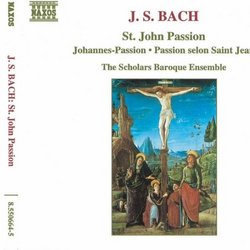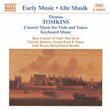| All Artists: Bach, Scholars Baroque Ensemble Title: St John's Passion Members Wishing: 0 Total Copies: 0 Label: Naxos Release Date: 11/29/1994 Genre: Classical Styles: Opera & Classical Vocal, Historical Periods, Baroque (c.1600-1750), Sacred & Religious Number of Discs: 2 SwapaCD Credits: 2 UPC: 730099566421 |
Search - Bach, Scholars Baroque Ensemble :: St John's Passion
 | Bach, Scholars Baroque Ensemble St John's Passion Genre: Classical
|
Larger Image |
CD DetailsSimilar CDs |
CD ReviewsMy favorite reccording of a Passion agargui | Medellin, Antioquia Colombia | 03/25/2001 (5 out of 5 stars) "I am an addict to Bach. And the truth is that this is not only the best interpretation I have ever listened of this passion, but also of Bach as author of coral works in general. I prefer this recording of the Johannes-Passion to any other, including those of more noted orchestras and more expensive seals. The Arie "Ich folge dir gleichfalls mit freudigen Schritten" sung by Janet Coxwell proves that true beauty exists. As a sample of the excellence of the choir, listen to "Wer hat dich so geschlagen". I believe that the goal when interpreting Bach is not only to achieve technical perfection, but also creating an appropriate atmosphere. The atmosphere of this work of the Scholars Baroque Ensemble is incredibly intimate, the voices are limpid, the orchestra is expressive and there's a careful balance between the instruments and the choir. Congratulations to Naxos and to the English Baroque Ensemble for so magnificent work." Good, clear recording agargui | 06/12/2000 (4 out of 5 stars) "Naxos has once again continued its tradition of producing good performances, clearly recorded, at bargain prices. This recording is very good (although I admit I'm no expert on the work), and the digital recording is great - I could clearly hear the enunciation of each word. The CD notes include the full text, also.I gave it four stars only because I thought I could hear a little bit of an echo, perhaps from the place it was recorded. However, it could have been the speakers I was using at the time, which aren't my best. Without that echo, I'd give it five stars.At the Naxos price, this very good recording is a great buy - definately recommended!" Bach as He Should Be Done! Christopher G. Forbes | New York, NY | 04/07/2004 (5 out of 5 stars) "Of Bach's two surviving passion settings, the St. John Passion is the one that tends to be treated as an also-ran. It lives in the shadow of its larger and more famous sibling, the St. Matthew Passion. This is quite a shame, because the St. John Passion has charms that are every bit as wonderful as any in the other score. And, clocking in at just less than two hours, the dramatic passing of this Passion setting is perhaps greater than the other work. Traditionally sung on Good Friday, when the Passion story according to St. John is required in the liturgy, this work follows the form that had become standard by the 18th century. The story of the Passion was sung by an evangelist soloist, with the words of the characters and crowd were taken by other members of the ensemble. Early in German settings of the Passion consisted of just this bare skeleton, but by Bach's time, the settings were fleshed out with meditative arias and duets sung by soloists, and with hymns for choral forces, and possibly even for congregational singing. This is the pattern Bach inherited, and he did nothing innovative with the form. Bach's genius in this work is not in innovation, but in the perfection of its details. From the driving counterpoint of the opening chorus, to the beautiful meditations after the descent from the cross, this is a work of supreme spirituality and deep emotion. There are many excellent versions of this work on CD, but none can beat this Naxos CD for quality at an excellent price point. The work is performed by the Scholars Baroque Ensemble. This group is small in numbers and performs the work in an historically informed performance. The eight member choir doubles as soloists as well, as would be most likely in Bach's own time. The orchestra is of similar small dimensions. But what the work looses is overwhelming sound it more than makes up for in clarity, transparency and emotion. I for one, think the jury is no longer out on HIP of Bach. I still have old recordings of Bach with casts of thousands, that I certainly love dearly, but the HIP performances are vastly superior now to my ears. The vocal style and transparency of instrumentation point out what a marvelous orchestrator Bach really was, something that gets lost with the large ensembles of the past. The hallmark of the Scholars Baroque Ensemble is that they are conductorless, as an ensemble of Bach's time would be. Performances are coordinated by one of the members, but all members are free to work together in a chamber music fashion. This serves the music very well. The quiet moments are possessed of an intimacy that I've rarely heard in this work, and even the larger sections seem to gain power. The pacing of the group is outstanding. It would be fascinating to hear the work live to see if they can duplicate this extremely difficult feat in performance. But on CD it is certainly impressive and makes for a wonderful experience of this most eloquent of Bach's sacred works."
|

 Track Listings (14) - Disc #1
Track Listings (14) - Disc #1